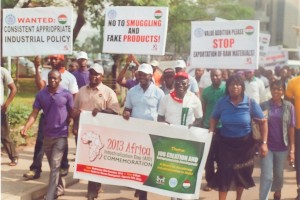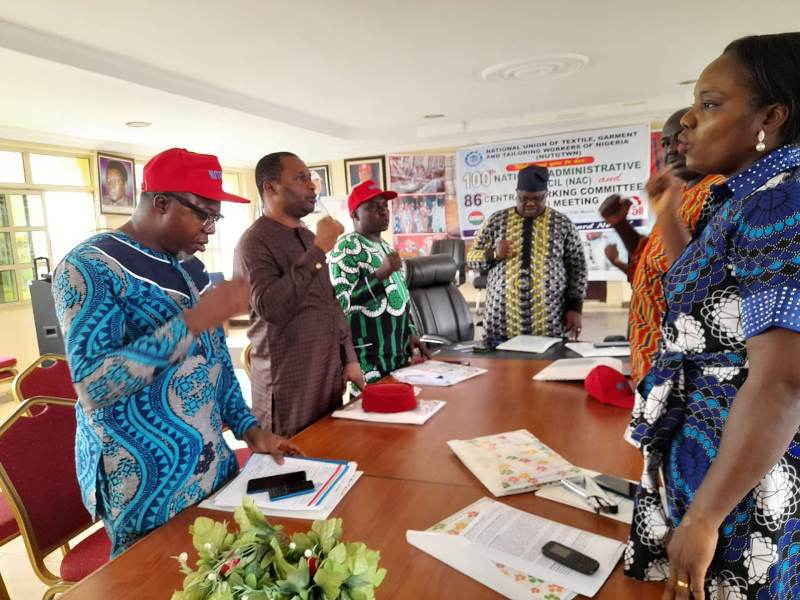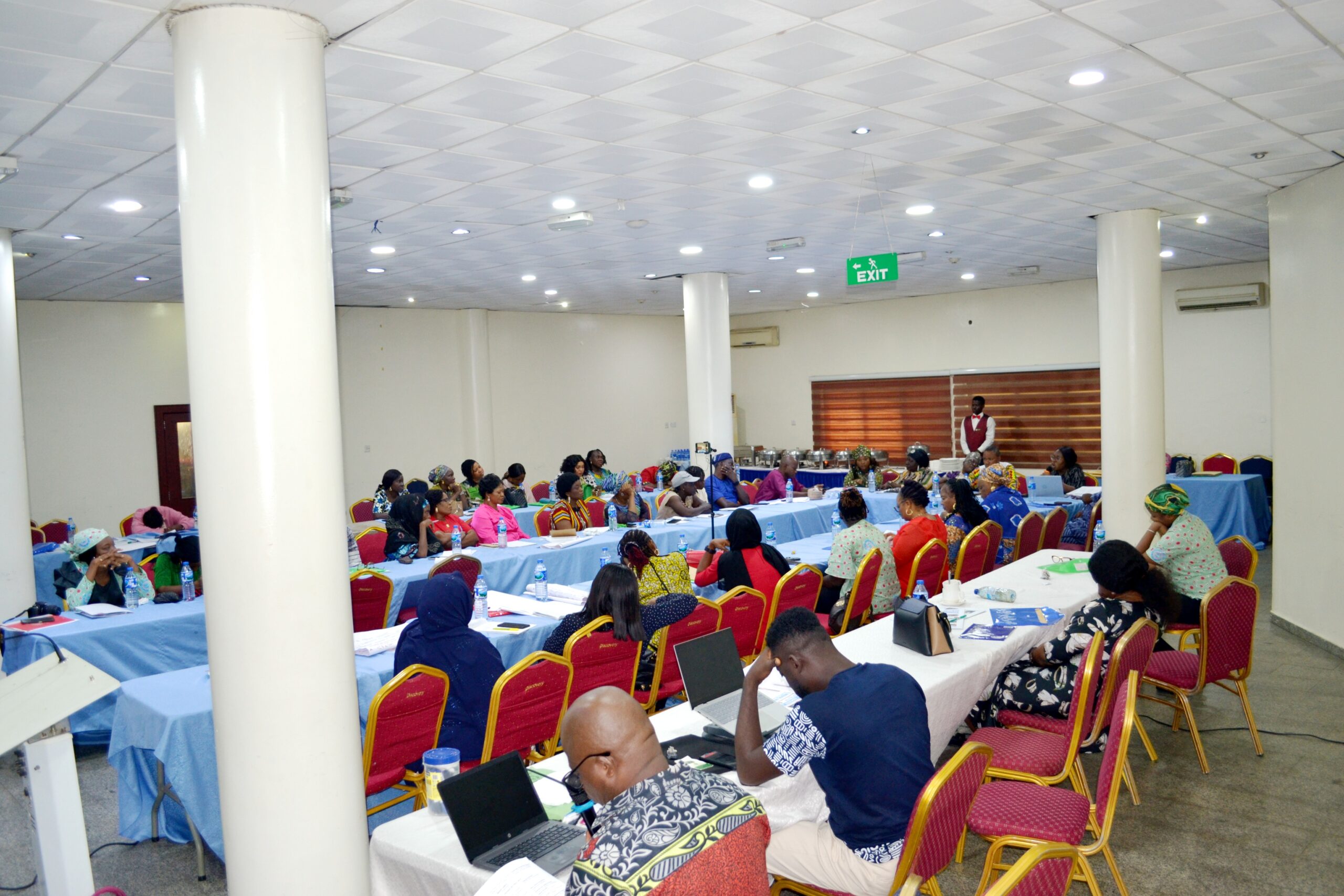Wednesday, November 20th marks 2013 Africa Industrialization Day (AID). Africa Industrialization Day is celebrated on November 20 each year. It is a day dedicated to examine ways to stimulate Africa’s industrialization process. It is also an occasion to draw worldwide attention to the challenges of industrialization in Africa often coordinated in Nigeria by the Federal Ministry of Trade and Industry. Today, there is one African who deserves to be singuled for championing the process of reindustrializing the continent. He is Alhaji Aliko Dangote the founder, President and Chief Executive of the Dangote Group. It is refreshing that Dangote Group of industries is changing the narrative of the continent from that of ‘resource curse’ to resource beneficiation, value addition and mass employment
through industrialisation.
In the age of systemic corruption and absence of development agenda, the official preoccupation is curtailing graft rather than advancing the much needed Industrialization process. Many thanks to the United Nations Industrial Development Organization (UNIDO) for coordinating events on or around Africa on Industrialization Day stimulating discussion on the industrialization of Africa and assessing the progress made in the past year. Industrialization is the process of transforming raw materials, with the aid of labour and capital goods, into consumer goods and services, new capital goods which permit more goods (including food) to be produced with the same human resources. Industrialization delineates between growth and development of nations. The advantages of industrialization include, creation of sustainable mass decent jobs, lessening dependency on imports, thus saving scarce
foreign exchange and ensuring enhanced government revenue through value added taxes. The campaign for Industrialization by the nationalist leaders at independence in the 1960s was part of the decolonisation process. Under Colonialism, African colonies were producers of raw materials and consumers of goods and services from the metropolitan Europe. We are all familiar with how according to Walter Rodney, “Europe underdeveloped Africa” through deliberate denial of value additions,exportation of raw materials and dumping of finished products. Africa”s founding fathers and mothers must be hailed for their commitment to industrialization in a way that a decade after independence, they commendably reversed dependence, built factories, trained the hands, mass-employed millions, produced goods and services through value additions which a century long colonialism denied. In Nigeria, we recall with nostalgia, the great industrial estates of Ikeja/Ilupeju, Sharada/Bompai Kano, Trans Amadi of Port Harcourt, Aba and Enugu industrial estates as well as Kakuri, Nassarawa industrial estates of Kaduna among others. In the case of Ghana, late Kwame Nkrumah as far back as 1961 in addition to scores of factories audaciously established Tema Oil Refinery even without discovery of oil and gas then! His eye and heart was on local value addition, indepedence not on imports and dependence. African founding fathers certainly had a vision of beneficiation. They also worked their vision through aggressive industrialisation and internal articulation of their economies. In the 60s and 70s some African countries including Nigeria were indeed ahead of countries like China, India, Indonesia in terms of
manufacturing value added. Alas today, we are inadvertently back to deindustrialization of the colonial era. Africa remains a resource rich continent but with low levels of industrialisation. It exports mineral resources from diamond to oil and gas, cotton to crude oil. Some African leaders gullibly agonize about ‘resource curse’ while the founding fathers long forsaw resource blessings, promoted strong industrial policies that recognized manufacturing as a key engine of growth for national economies. UNIDO (2004) shows that manufacturing industry in Sub-Saharan Africa (SSA) lags behind other developing regions in almost all measures of economic development, namely income per head, industrialization and agricultural productivity. The distribution of manufacturing activity in SSA, measured by the
dollar value of manufacturing value added (MVA), is highly skewed. Indeed with the exceptions of South Africa and Mauritius, MVA per head in the 15 most industrialized countries is very low. South Africa is the only country in which manufacturing plays a major role in both domestic output and exports, while Mauritius, an island with a population of only1.2 million inhabitants, is best described as an export platform. Nigeria which once in 70s and early 80s boasted of robust manufacturing sector contributing as much as 25 per cent of GDP has fallen down on manufacturing ladder to less than 5 per cent of GDP relying on extractive sector of oil and gas with very little value addition.
Against this background, it is encouraging that Aliko Dangote comes out boldly as the new African re-industrialiser. What increasingly marks Aliko out is his commitment to value addition and beneficiation to the abundant raw materials in the continent. African development observers were recently excited about the bold corporate decision of the Dangote Group, the West African conglomerate blazing the trail in re-industrialising Africa through an unprecedented investment of $9.3billion in oil refinery and petrochemical complex in Nigeria. The refinery located at the Olokola Liquefied Natural Gas (OKLNG) Free Trade Zone in Nigeria would be Nigeria’s first private and Africa’s largest petroleum refinery, with a projected daily production output of 400,000 barrels a day, the same capacity of the combined 4 Nigerian government-owned refineries in Port Harcourt, Warri and Kaduna.
At the 2013 9th All Nigerian Editors’ Conference held in Asaba, Delta State recently Aliko Dangote in a key note address entitled; ‘Nigeria Beyond Oil’ said his group believes “.. industrialization is the key to Nigeria’s economic prosperity”. He added that ” …we also believe Nigerians should drive the industrialization process. As a practical demonstration of our business philosophy, we have massive investments in the real sector both within and outside the country. Currently, we have over 13 subsidiaries in Nigeria and operations in 14 other African countries.”
Very few quotable quotes in favour of industrialization are as apt as Aliko’s in Africa. If we add the Dangote cement new plants in Cameroon, South Africa, Zambia and similar factories in Congo, Ethiopia and Tanzania, we might be witnessing investment patriotism/ investment pan Africanism which the founding fathers of Africa envisioned but was wrongly abandoned for the discredited IMF/ World Bank’s inspired adjustment programme (read; deindustrialization) of the mid- eighties. South Africa’s Minister of trade and industry, Rob Davis sums it up. According to him “we can’t be any longer just participating in global value chains as producers and exporters of primary products and importers of finished products”. Again it comes to governance. More than ever before, government has business in business
through smart and consistent industrial policy, skewing government spending to patronise African products, long term and cheaper financing and provision of basic infrastructure, the most critical being electricity without which there can be no Industrialization. Africa must try to produce what it consumes and try and consume what it produces. As we have seen with China, the key out of poverty is aggressive Industrialization and mass employment.
ISSA AREMU mni Vice President, NLC and Chairman, Africa Executive Committee of Global IndustriALL Union, Secretary General Alumni Association of the National Institute( AANI), Kuru Jos
Secretary General Alumni Association of the National Institute( AANI), Kuru Jos








